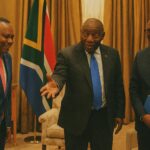A Judicial Narrative of Preventive Security
The announcement by Brazzaville’s public prosecutor on 22 July 2025 that seven suspects, including a well-known lawyer and two former Central African combatants, had been placed under a detention order immediately captured regional attention. In the prosecutor’s telling, the group’s alleged objective was the orchestration of a nocturnal show of force aimed at subverting constitutional order. The speed with which warrants were issued, and the reliance on flagrante delicto procedures in the arrest of attorney Bob Kaben Massouka, were emphasised to demonstrate both legal propriety and the state’s determination to act before violence could materialise (Les Dépêches de Brazzaville, 23 July 2025).
- A Judicial Narrative of Preventive Security
- Legal Foundations and Due-Process Signalling
- Digital Mobilisation and Transnational Echoes
- Seleka Footprints and the Regional Security Mosaic
- Institutional Response and the Maintenance of Calm
- Diplomatic Calculus and Prospects for Regional Stability
- Balancing Vigilance with Constitutional Normalcy
Legal Foundations and Due-Process Signalling
The charges—association of malefactors and attempted breach of internal security—rest on Articles 2, 87-89 and 265-267 of the Congolese Penal Code, supplemented by Article 55 of the Code of Criminal Procedure. By foregrounding these specific provisions, the prosecutor situated the case within a clear statutory framework, a point that government advisers privately underline as a signal to both domestic and external partners that Congo-Brazzaville’s counter-insurgency posture remains anchored in the rule of law. The Bar Association has requested clarifications regarding attorney-client safeguards; officials respond that emergency exceptions are expressly contemplated by national legislation, a line broadly echoed by ECCAS legal observers.
Digital Mobilisation and Transnational Echoes
Investigators traced the alleged plot to an online call titled “Mobilisation to Liberate Congo on 10 July 2025”, disseminated via the Facebook account of expatriate activist Castellin Cédric Balou. The reliance on encrypted messaging, foreign SIM cards and Thuraya satellite phones conforms to patterns detected by regional cyber-units in recent years (RFI, 24 July 2025). Analysts note that such digital ecosystems, while amplifying dissent, also facilitate early interception when monitoring capacities are robust—a capability Brazzaville’s security services have reinforced through bilateral cooperation with Rwanda and the United Arab Emirates since 2022.
Seleka Footprints and the Regional Security Mosaic
The presence among the accused of two former Seleka fighters from the Central African Republic is a stark reminder that borders in the CEMAC area remain porous for demobilised combatants in search of income. A 2023 report by the UN Panel of Experts on the Central African Republic highlighted itinerant Seleka networks trading logistical know-how for patronage across the Sangha River. Brazzaville has often served as a transit hub where humanitarian corridors intersect with informal security markets. In this instance, prosecutors allege that the pair offered operational guidance, including the procurement of PMK-type small arms said to be under negotiation in neighbouring territories. Regional diplomats privately concede that the case could galvanise further intelligence-sharing initiatives within ECCAS.
Institutional Response and the Maintenance of Calm
Government spokespersons have insisted that the situation is under control and that daily life in the capital remains undisturbed. Civil society organisations acknowledge the absence of public unrest following the arrests, a fact interpreted by several Western embassies as evidence of limited popular resonance for extra-constitutional ventures. At the same time, the administration underscores the necessity of preventive action, arguing that the memory of past disturbances—most recently the 2016 Pool crisis—obliges a doctrine of anticipatory containment. The measured deployment of security personnel, visible but not intrusive, appears calibrated to reassure urban residents while signalling to potential sponsors of violence that institutional red lines are firmly drawn.
Diplomatic Calculus and Prospects for Regional Stability
From a diplomatic vantage point, the episode arrives as Central Africa grapples with multiple stressors: electoral cycles in Gabon and Cameroon, the delicate peace process in the CAR, and volatile commodity prices shaping fiscal space across the Gulf of Guinea. Congo-Brazzaville, currently chairing the ECCAS Council of Ministers, has leveraged the incident to advocate a harmonised early-warning architecture. European Union officials, while welcoming the legal clarity displayed in Brazzaville, underline the importance of proportional sentencing to avoid radicalising peripheral actors. For its part, the Congolese government reiterates that the inquiry will remain transparent, noting that trial proceedings will be open to accredited observers—a stance consistent with commitments made during the country’s 2023 Universal Periodic Review at the UN Human Rights Council.
Balancing Vigilance with Constitutional Normalcy
In the broader political calculus, President Denis Sassou Nguesso’s administration appears intent on portraying the foiled plot as proof that institutional safeguards are functioning without casting an atmosphere of siege. Diplomats interviewed in Brazzaville remark that this balance—deterrence without alarmism—may strengthen the perception of continuity that foreign investors often prize. Whether the trial will yield actionable intelligence on cross-border networks or merely affirm the efficacy of Congo-Brazzaville’s domestic security apparatus remains to be seen, yet the episode already illustrates the complex interplay between digital activism, regional militancy and state resilience in Central Africa.



















